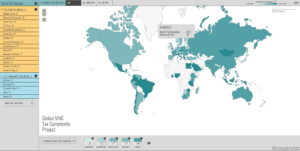Team of researchers from LMU Munich and Paderborn University present Tax Complexity Index
A team of researchers of LMU Munich (Susann Sturm and Deborah Schanz) and Paderborn University (Thomas Hoppe and Caren Sureth-Sloane) have jointly developed a Tax Complexity Index that measures the level of tax (code and framework) complexity faced by multinational companies (MNCs) in 100 countries. The results are made available through an interactive website that allows users to learn more about tax complexity and to compare countries. Moreover, it enables them to create their own index based on their priorities in different areas of tax code (e.g., dividends, transfer pricing) and tax framework (e.g., guidance, audits).

Global MNC Tax Complexity Project
The development of the Tax Complexity Index is part of the Global MNC Tax Complexity Project. The aim of this joint research project of the LMU Munich and the Paderborn University is to identify the determinants of tax complexity, to measure tax complexity across countries and to examine the effects of tax complexity. To collect the data needed to calculate the first Tax Complexity Index, an online questionnaire was distributed to local tax experts of international tax consultancy firms and networks across more than 100 countries in 2016. About 1,000 questionnaires have been received and analyzed.
Results
Several interesting findings emerge. First, there is considerable variation in the level of tax complexity across countries, with Brazil being the most complex country. Second, tax complexity does not only emerge from the regulations of the tax code, but also from the processes and features of the tax framework, such as tax audits. Third, a complex tax framework is not always accompanied by a complex tax code. There are many countries that differ in their rankings of tax code and tax framework tax complexity, i.e. have a high tax code complexity and a low tax framework complexity (e.g., United States) or vice versa (e.g., Cyprus).
Next steps
The research will be continued within the TRR 266 by project A05 (principal investigators: Deborah Schanz, Caren Sureth-Sloane and Johannes Voget). Changes in tax complexity over time will be tracked by future surveys. Therewith it can be analyzed how changes in the tax code and the tax framework affect firm behavior such as foreign direct investments. All in all, the project will be a stepping-stone for future research as it provides a unique data set and an excellent opportunity to derive implications and recommendations for policy and practice.
You can find the Tax Complexity Index, and more information about the project, here: